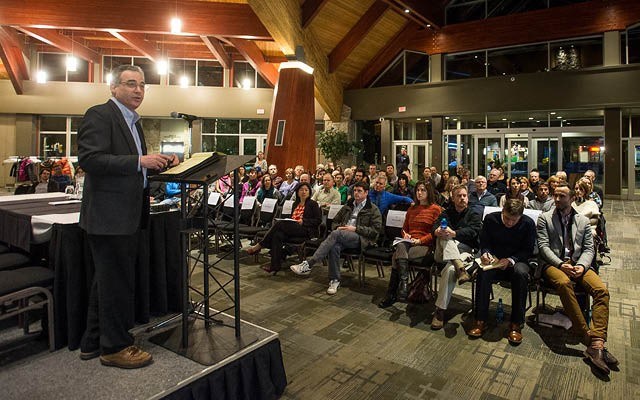There's reason to worry about Whistler's economic future and lots of room for improvement, according to one of the world's leading experts on community economics.
With those opening remarks Michael Shuman had a captive audience, as roughly 130 people in the Sea to Sky corridor sat up and took notice of an outside, expert view of what's happening right here in town.
"I do worry that you are in a very climate-dependent industry, and climate is moving in very unexpected directions," said Shuman at the Feb. 26 talk.
"You must... treat the moment you are in right now as a surplus moment."
After the meeting Shuman expanded:
"Let's talk in a more familiar context. So our potentates of the mid-East are sitting on hundreds of billions of dollars of oil. So the smarter potentates, when they draw that oil and sell it, they will use that oil to create more diversified economies, so that when the oil runs out, they're in a good position. The dumber potentates will say 'we're going to have a party until it's all over and we think this is going to go forever.' And what I'm saying is, your oil field is the tourist industry. It's going to last for a long time, but it's not going to last forever. And a smart economic policy will be mindful of that, and take this period of success and start investing modest amounts of your profit into the diversification of your economy, so that we're thinking not just five years ahead but in several generations ahead."
Shuman sparked a two-hour discussion on the power of local economics, filled with several American success stories outlining how communities can create local wealth.
"I thought it was one of the most inspiring events I have been to in Whistler," said Councillor Jack Crompton. "It's exciting to think what investing in our local economy can deliver for our community."
By Shuman's measure there are three rules for a successful economy:
• maximize the percentage of jobs in locally owned businesses;
• maximize your level of local self-reliance through diversification of the local economy;
• find great models of triple bottom line success — sustainability by financial, social and environmental performance measures — and spread them.
On his second point, the matter of diversification, Shuman was clear: "At the end of the day you have to face the fact that you are a one-industry town, and one-industry towns don't always fare so well."
Look at Detroit, he said. The Motor City reached a peak population of 1.8 million in its hey-day as the Mecca of the auto industry; it's now home to 700,000 and last year filed for Chapter 9 bankruptcy with a debt estimated at $18-20 billion.
Rather than focus on the negative, Shuman told the story of Zingerman's Deli, from Ann Arbor, Michigan.
Zingerman's reached a fork in the road, faced with the decision to become a chain, or not.
It chose not to.
Rather than grow wide across the country, Zingerman's grew deep: it created a bread company, a coffee-roasting company, a mail order cake business, a customer-service company, all in Ann Arbor.
Zingerman's now has nine independently owned businesses, employing 550 people in Ann Arbor, making $40 million per year.
"Economic development would have said this was impossible," said Shuman.
"They created a cluster of activity from scratch."
And then he posed the question: "Who's your next Zingerman's?"
He answered with more questions: Is it Alta Bistro? Is it Prior Snowboards and Skis?
Shuman then took his three rules further to the implementation stage, outlining what he called the six P's:
• planning — plugging the leaks;
• people — support entrepreneurs;
• partner — compete through collaboration;
• purse — harness pensions locally;
• purchasing — spearhead "Local First" campaigns;
• policymaking — remove all anti-local biases.
Shuman gave real-town examples of each.
Take Metro Cleveland, Ohio, as an example of "plugging the leaks," he said.
Cleveland looked at the impacts of shifting its food economy by 25 per cent. This shift reemploys 27,000 people and each year generates $868 million in wages, $4.2 billion in output, $126 million in state and local tax and $127 million in reduced unemployment.
Not to mention other benefits in the environment, public health, and Cleveland's global image.
"You folks have a lot of work to do," he said.
"You know almost nothing about the leaks in your economy."
However, after the meeting Councillor Jayson Faulkner pointed to a 2006 Sustainable Retail Study Background Report from the municipality, which details the leakage in Whistler.
While acknowledging the numbers are dated, the report shows a total resident expenditure potential of $141 million with sales leakage of more than $37 million.
Those leakage numbers have likely risen in recent years with Internet shopping, among other things.
Graham Murphy, of Murphy Construction, responsible for building a large portion of the athletes' village for the 2010 Olympics, was part of a three-man panel to encourage discussion after Shuman's talk. Murphy pointed to the construction industry as an example of leakage, pointing to Vancouver companies being chosen over local construction companies for major capital projects in the resort.
"I think that's a major capital loss right there," said Murphy.
Panelist Jeff Dawson, general manager of Community Futures Howe Sound, said: "There's nothing that we heard here tonight that we can't replicate here."
Shuman's event was part of the Whistler Centre for Sustainability's work in the Sea to Sky corridor that aims to strengthen shared value local economic initiatives.




